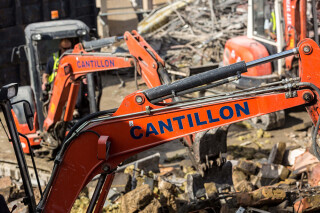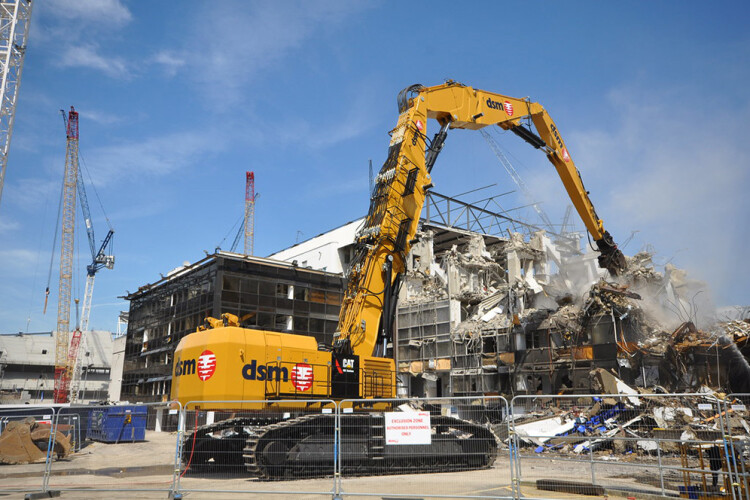Cartel activity is, sadly, not uncommon in the construction industry. It might not plumb the criminal depths of Italy’s mafia or Colombia’s cocaine cartels, but bid-rigging and price-fixing is still a serious crime here in the UK.
Read the website or the annual report of any leading contractor in the UK construction industry and you won’t have to look far to find pious statements about corporate social responsibility or environmental and social governance. The big firms are always the first to advertise their corporate virtues. Ironically, they are also often the most likely to collude with their competitors to rip off the market.
So it was a shock, though not a surprise, when the Competition & Markets Authority (CMA) announced in March that it had levied fines of almost £60m for illegal bid-rigging against 10 UK demolition contractors. All but one, Clifford Devlin, are in the top 20 companies in their sector.
The CMA found that the companies had colluded on prices when submitting bids in competitive tenders for contracts between January 2012 and June 2018. Their bids were rigged to deceive customers into thinking that they were competitive when that was not the case.
The CMA levied its largest fine, of more than £17m, to Erith. It also disqualified three company directors, exercising a power granted to it in 2003 but first used only in 2016.

The announcement came as no surprise partly because the CMA had already announced (in March 2019) that it was opening an investigation into suspected anti-competitive arrangements in the construction sector. And following its investigation, the CMA provisionally found in 2022 that the 10 firms had illegally colluded to rig bids for demolition and asbestos removal contracts.
The deceptions involved one or more of the construction firms agreeing to submit bids that were deliberately priced to lose the tender. This practice, known as cover bidding, can result in customers paying higher prices or receiving lower quality services.
In addition, the CMA found that five of the firms – Brown & Mason, Cantillon, McGee, Scudder and Erith – were involved in arrangements by which the ‘losers’ of the contracts would be compensated by the winner.
The value of this compensation varied but in one instance it was more than £500,000. Some firms produced false invoices to hide this part of the operation.
The CMA found that the instances of illegal collusion took place over a five-year period and affected 19 contracts for demolition work in London, southeast England and the Midlands.
Not all the firms colluded in each of these contracts, and not every contractor that submitted a bid for these contracts was involved in the illegal collusion.
Announcing the fines, Michael Grenfell, the CMA’s executive director for enforcement, said: “The construction sector is key to our country’s prosperity, so we want to see a competitive marketplace delivering value, innovation, and quality.
“Today’s significant fines show that the CMA continues to crack down on illegal cartel behaviour. It should serve as a clear warning: the CMA will not tolerate unlawful conduct which weakens competition and keeps prices up at the expense of businesses and taxpayers.
“We have also secured the disqualification of certain company directors involved. Company directors must understand that they have personal responsibility for ensuring that their companies comply with competition law, and that disqualification may follow if they fail to do so.”
The CMA investigation included unannounced inspections of 15 business premises and interviews with 35 people. It served more than 120 notices requiring the provision of information or documents and scoured emails, mobile phones and financial records relating to the parties.
At least two of the companies – Keltbray and Squibb – have said they will challenge the fines imposed by the CMA. Keltbray said that it would be appealing the penalty, arguing that its £16m fine was based on group turnover, rather than the turnover of its demolition subsidiary, which has since been wound down. It had been expecting a £6m fine, for which it had made a provision in its 2021 accounts.
Although it no longer has a dedicated demolition business, Keltbray has not exited the sector. Instead, it has restructured and its demolition activities are now undertaken by Keltbray Structures, Keltbray Remediation and Keltbray Decommissioning.
Keltbray chief executive Darren James – who joined the business in April 2020 – said: “We strongly condemn anti-competitive practices and treat all matters that reflect on our compliance with statutory obligations with the utmost gravity. Keltbray has cooperated fully with the CMA throughout this inquiry relating to activities between 2009 and 2017.
“Since that time, much has changed. Keltbray today is a very different organisation with the necessary controls and independent oversight in place, following the early adoption of the Wates Corporate Governance Principles for large, private companies, to ensure these isolated events could never reoccur.

“The reported CMA penalty is based on Keltbray’s total group turnover, rather than the actual level of culpability relevant to the wound down subsidiary. Keltbray is a large, highly diversified business, with demolition representing a small proportion of total revenues. Keltbray will be appealing the penalty decision.”
Squibb has also said it will appeal against the fine handed down by the CMA, claiming that its £2m penalty is disproportionate. The company said: “The focus of the appeal will, for the most part, concentrate on the background to and determination of the fine. In particular, the fact that the fine is disproportionate when seen in the context of the wider investigation and the other infringements discovered as part of the CMA investigation.”
Unlike Keltbray, Squibb had made no provision for any fine in its accounts last year.

Colluding companies

The 10 companies involved in the cartel, and the fines for each, are:
Brown & Mason £2,400,000
Cantillon £1,920,000
Clifford Devlin £423,615
DSM £1,400,000
Erith £17,568,800
JF Hunt £5,600,000
Keltbray £16,000,000
McGee £3,766,278
Scudder £8,256,260
Squibb £2,000,000
Disqualifications
As a result of the CMA investigation, three directors of companies involved in the bid-rigging have been disqualified. These are:
David Darsey
(formerly a director of Erith) for a period of five years and 10 months;
Michael Cantillon
(formerly a director of Cantillon) for seven years and six months;
Paul Cluskey
(current director of Cantillon) for four years and six months.
Previous form
Prior to the discovery of the demolition cartel, the CMA had fined construction firms a total of £67m in a run of five cases involving a range of construction products and services, from concrete drainage and groundworks through to office fit-outs, galvanised steel tanks and roofing materials.
As well as imposing stiff fines, the enforcement action resulted in the disqualification of 11 directors and two criminal convictions.
In 2020, the CMA fined groundworks equipment suppliers VP and MGF a total of more than £15m (£11.2m and £3.7m respectively for colluding on prices over a six-year period. The two companies had been sharing confidential pricing information and had coordinated their commercial activities to monitor each other’s prices and challenge quotes they deemed too low.
In the same year, two of the UK’s largest suppliers of roofing lead, Associated Lead Mills and HJ Enthoven, admitted collusion and were fined more than £9m. The two firms had an agreement not to target certain customers and had exchanged commercially sensitive information over a period of two years.
In 2019, Stanton Bonna, FP McCann and CPM – three leading manufacturers of precast concrete drainage products – were issued with fines totalling more than £36m for market-fixing.
The CMA found that from July 2006 to March 2013, the three companies agreed to fix or coordinate their prices, shared the market by allocating customers and regularly exchanged competitively sensitive information.
In a 2021 blog-post the CMA said: “We’re urging the wider industry to take note to avoid making similar mistakes and are reminding company directors of their responsibility to lead by example and be aware of how their organisation is operating.”
But for the 10 demolition firms fined last month, the warning came too late.
Got a story? Email news@theconstructionindex.co.uk
.png)


